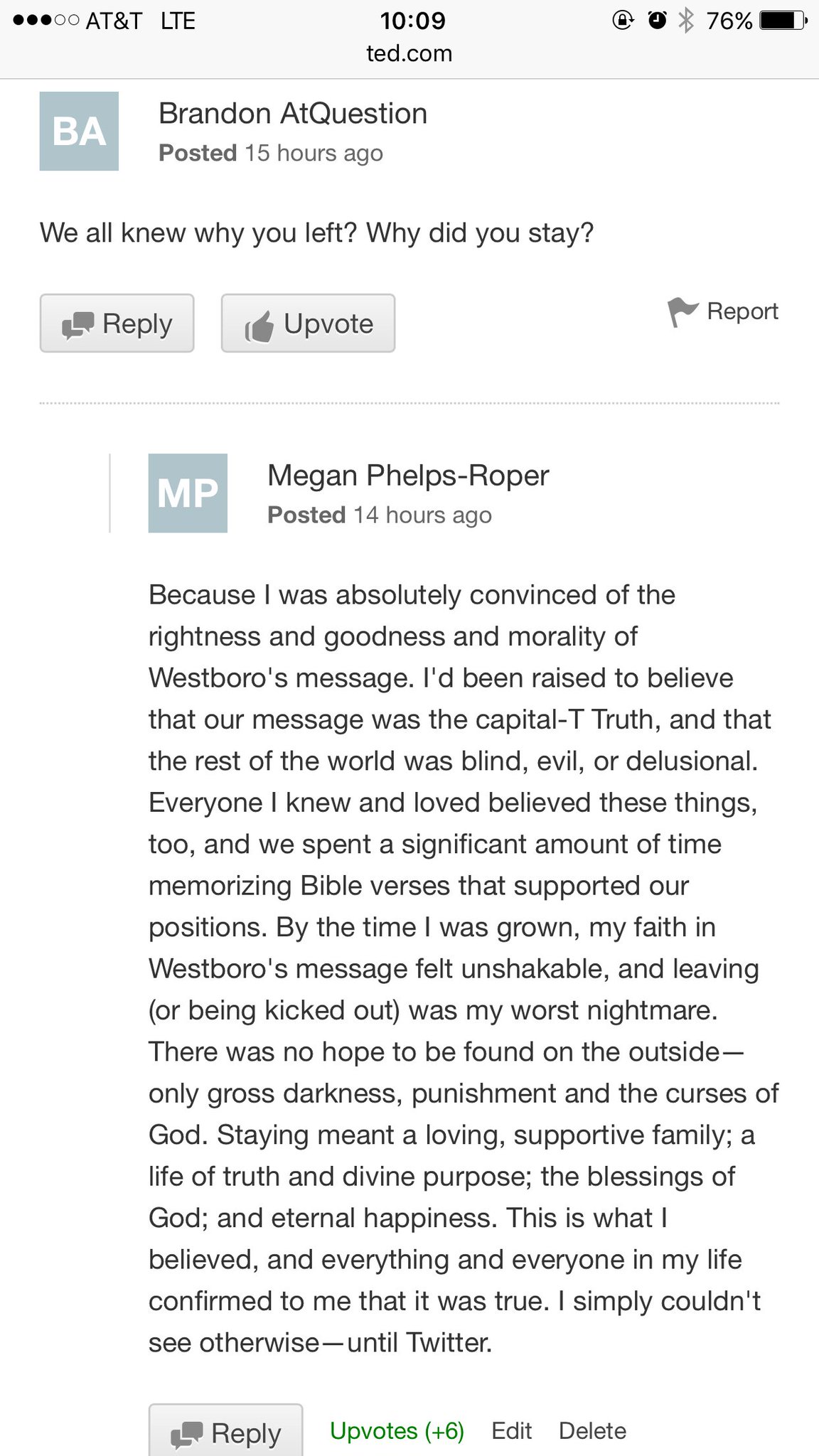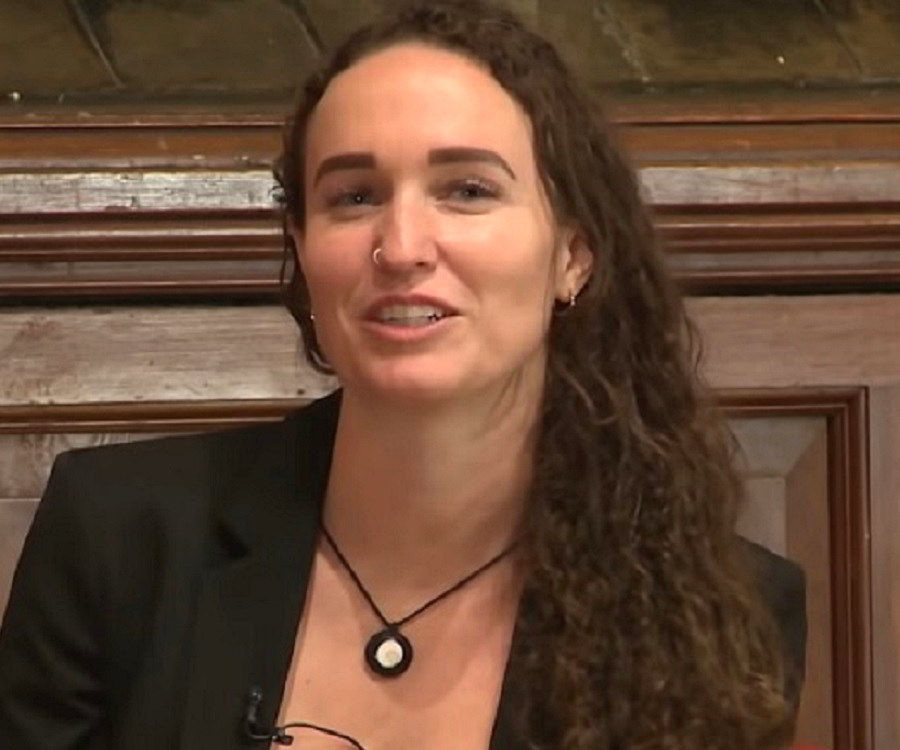Just finished Megan Phelps-Roper's book 'Unfollow' and I'm finding my conviction for compassionate conversation reinvigorated. If she can change, anyone can change, and if there's anything this book makes clear it's that compassion is the bridge that will take us there. I'm so deeply impressed by how candid Phelps-Roper's prose is. Megan Phelps-Roper is a beautiful writer, and her journey - from Westboro to becoming one of the most empathetic, thoughtful, humanistic writers around - is exceptional and inspiring. I met Megan shortly after she left her church. She said, 'I want to do good, but I don't know how.' With Unfollow she's figured out how.
Unfollow By Megan Phelps Roper
The activist and TED speaker Megan Phelps-Roper reveals her life growing up in the most hated family in America. She will begin a national tour starting October 8 through November 6, ending at DDR Books.
Megan Phelps Roper Book

Unfollow By Megan Phelps-roper Summary

PASSING motorists screamed obscenities and threw bottles of urine at Megan Phelps-Roper and her family as they waved placards scrawled with homophobic messages by the roadside in Topeka, Kansas. Megan Phelps-Roper is the author of Unfollow (4.18 avg rating, 10224 ratings, 1390 reviews, published 2019) and Unfollow (0.0 avg rating, 0 ratings, 0 re. A gripping memoir of escaping extremism and falling in love, Unfollow relates Phelps-Roper’s moral awakening, her departure from the church, and how she exchanged the absolutes she grew up with for new forms of warmth and community. Rich with suspense and thoughtful reflection, Phelps-Roper’s life story exposes the dangers of black-and-white thinking and the need for true humility in a time of angry.
At the age of five, Megan Phelps-Roper began protesting homosexuality and other alleged vices alongside fellow members of the Westboro Baptist Church in Topeka, Kansas. Founded by her grandfather and consisting almost entirely of her extended family, the tiny group would gain worldwide notoriety for its pickets at military funerals and celebrations of death and tragedy. As Phelps-Roper grew up, she saw that church members were close companions and accomplished debaters, applying the logic of predestination and the language of the King James Bible to everyday life with aplomb―which, as the church’s Twitter spokeswoman, she learned to do with great skill. Soon, however, dialogue on Twitter caused her to begin doubting the church’s leaders and message: If humans were sinful and fallible, how could the church itself be so confident about its beliefs? As she digitally jousted with critics, she started to wonder if sometimes they had a point―and then she began exchanging messages with a man who would help change her life.

A gripping memoir of escaping extremism and falling in love, Unfollow relates Phelps-Roper’s moral awakening, her departure from the church, and how she exchanged the absolutes she grew up with for new forms of warmth and community. Rich with suspense and thoughtful reflection, Phelps-Roper’s life story exposes the dangers of black-and-white thinking and the need for true humility in a time of angry polarization.
Okay. I just put this book down mere moments ago, and I am fully enveloped by the “book hangover” effect.
This book felt personal to me. Having grown up in a cult-like family, myself, where I was taught from birth that we were part of a small faithful remnant. We had all of the answers and we understood the Bible perfectly (unlike the sheep sitting in the pews of most churches). I was taught to view outsiders with an air of suspicion. I was taught to pity them for not fully understanding the gospel like we did. My family was even instrumental in splitting a church once because *we* had the truth, and the deceived only wanted to scratch their itching ears with worship music, teachers, and doctrine that clearly fell outside the lines of “sound” and Biblical truth.
In my case, my family was not world famous. When it was time for me to part ways with my family and the harm that we’d caused, I could slide into the big and forgiving world outside of our home. I could learn how to navigate life away from the directives and expectations of my family without the added pressure of a famous last name.
Megan Phelps-Roper had a very different story.
In this book, she covers the history of the Westboro Baptist Church. She begins with her grandfather, Fred Phelps, being called to ministry and planting a sister church to an already established Baptist church in Kansas. She describes how this church later decided to end their association with WBC when they discovered how radical the doctrine Fred Phelps taught was becoming. She describes the very moment that it seems Fred Phelps decided to make homophobia a central teaching of Westboro Baptist Church.
Phelps-Roper also gives a much needed nuanced feel to her who family was. I was shocked to discover that Fred Phelps was once a great champion for civil rights, and was even recognized by the NAACP for his efforts. While she does discuss child abuse that passed down the family line from Fred Phelps to her mother, Shirley, Phelps-Roper also paints a picture of an extremely loving, affectionate, and close knit family.
Unfollow By Megan Phelps-roper
The narrative she creates about how she grew up being taught the doctrines of her church as the one possible truth with zero room for accountability or possibility of error, helps to draw the reader in to get a sense of why she once believed the things she did and why her family still in the WBC continues to believe these things. We follow her story as she begins to develop relationships with critics of the WBC on twitter and small niggling doubts about her beliefs begin to take shape.
As she describes her terror in coming to terms with questioning her church, her beliefs, her Bible, and her God, it’s hard not to feel sympathy for the position Phelps-Roper suddenly seems to find herself in. Does she choose the comfort and safety of her family home and church? Or does she follow her doubts and disagreements out the door and into the world?
It’s hard not to cheer for her as she and her sister begin to make plans to leave and suddenly find that choice ripped from their hands as their discussions and intentions are made known to their family. In one traumatic night, they are kicked out of the only home they’ve ever known.
What follows is the story of how she slowly began to deconstruct from the black & white worldview that had been ingrained in her. She meets new people, experiences new things, and has her thoughts and beliefs challenged. She begins to allow room for shades of grey and eventually decides that doubt is not the sin she once believed it was.
As the book closes, Phelps-Roper discusses the plague of extremism that is taking over American culture, particularly in the wake of the 2016 election. She notes the importance of leaving room for nuance and learning to see from another’s perspective.
I rated this book 5 stars on GoodReads. If I could have rated it 10 stars, I would have. I think this is an important read for everyone, but particularly for those of us who grew up in religious environments where we were taught that we are/were the only people God had chosen to bless with the truth and the plan of salvation.




